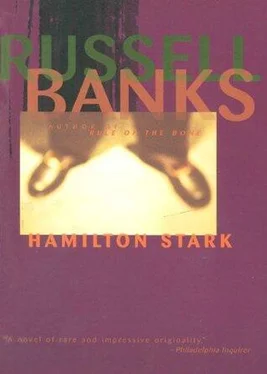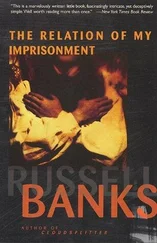That night she slept alone again, and again she didn’t know where her new husband slept if he had slept at all, for when at seven-thirty she went out to the kitchen, even though it was Saturday and not a workday, once again the light was burning and his breakfast dishes were in the sink and his car was gone. Around nine he returned, with the newspaper and the week’s groceries, ale, and Canadian Club. He had begun his regular weekend routine. Dora, of course, did not know this yet, but by eleven, when she had watched him several times perform some menial or trivial task in the yard or house and then pull a pen and small black notebook from his shirt pocket and make a mark in the book, she realized that he was indeed performing a weekly ritual. That’s when it occurred to her that the man had no intention of attending his mother’s funeral. She could not say with confidence, however, that it was his intention, actually, not to go, for she also believed that he was unable to go, that forces beyond and stronger than any of his intentions were keeping him at home on this day, notebook and pen in hand, checking off his chores, one by one, as he did them.
She decided it was safe to tell him, simply and straightforwardly, that she would be going to the funeral. Whatever ritual he was going through, she knew that it did not include her, at present, in any way, and that she was free to attend the funeral or not. So, as he strolled whistling through the door with an armload of split wood for the kitchen woodbox, his face red and dry from the cold, she told him that she wanted to go to the funeral but had no way to get there.
“I’ll get you there,” he said cheerfully, clattering the wood into the box next to the large black stove. “What time’s the service?”
“One.”
“Well, you’d better hurry. I’ll drop you off on my way to Pittsfield,” he said, as if he were agreeing to drop her off at the library. “I forgot to stop at Maxfield’s this morning for some eightpenny nails and friction tape. By the time I get back from Maxfield’s, you ought to be ready for a ride home, so wait outside the church and I’ll pick you up as I come by,” he instructed her, and then he made another mark in his notebook and walked out to the barn.
Grateful, though somewhat perplexed, she quickly put on a dark gray, simply cut wool dress, hat and coat. By then it was a quarter to one, so she went out to the barn and presented herself. “I’m ready,” she announced.
When she came in, he had been filing the points on a circular saw blade, and when he saw her, he quickly put down his file and the blade, strode from the barn, got into his Chrysler, and started the motor. She slipped in next to him and tried to draw herself back and down into the seat. Somehow she felt he was doing a great favor for her, and in spite of his apparent cheerfulness and easy manner, she believed that the less space she took up the better.
They rode in silence for the mile and a half along the road to town, past the bleak, leafless maples and elms and clustering pines and spruce at the edge of the fields. The day was clouded over again, and everything was cast in shades of gray and tan — the dead grasses, the brush and weeds, the bony branches of the trees, even the houses and barns, trailers and cabins, that huddled in shabby groups alongside the road.
The First Congregational Church, located at the center of the village and facing the Parade, a square patch of open ground, was shaped like a long barn with a bell tower at one end. Though it was painted white, in the chill light it looked cement-gray and somber, more like a mausoleum than a barn or church. A dozen or so cars and pickup trucks, and a single black hearse, were parked on the road outside the church, and Hamilton had to pull out into the middle of the road to get past. But as he started to slow and stop at the end of the line of cars, a short, stout woman, then a tall, gaunt woman, followed by a thick man and two brittle-looking teen-aged boys, got out of a station wagon with a blue light on top. Hamilton drew in just beyond the car and came to a stop.
“That group getting out of the cruiser?” he asked her. “That’s Sarah, the short one. Jody and Chub Blount are the others, and their boys, Alfred and Alvin. Twins. If you want to go to the graveyard for the burial, ride out with Sarah and her husband, Mooney. Sam Mooney. He’s probably inside the church, getting set to ring the bell. He’s a deacon.”
“Is it all right?” She had opened her door and had one foot on the ground.
“All right? Well, I guess you’ll have to ask them . Sarah and Mooney. They’re the ones to tell you if it’s all right. Not me.”
She decided to risk it. She had got out of the car completely and was peering in at him through the open door. “Hamilton, I’m sorry, but please , tell me why you aren’t going to the funeral.”
He gripped the steering wheel with both hands. “Go,” he said stiffly, not looking at her. “Go on. You haven’t imagined being dead, so you go on. It’ll help you keep from imagining it a while longer.” He paused a second and pursed his lips as if he were about to whistle, then went on. “To me, not imagining being dead is like believing in Santa Claus, you ought to do it as long as you can. So go ahead, you deserve it,” he said, suddenly smiling into her puzzled face. “We all do.”
So she did go, as he instructed, first to the funeral service, which was appropriately somber and brief, and, after the ceremony, she left her seat at the back and paraded with the others past the coffin and looked down, once, at the embalmed, parchmentlike face of the old woman, and then filed out of the church, where she joined the rest of the people at the roadside and where she introduced herself to the stout woman Hamilton had pointed out and who had by then been joined by her husband, also stout and as short as his wife.
When Dora asked if she could ride with them to the cemetery, it was the man, Mooney, who smiled and said, “Of course,” and when they had driven the three miles out of town to the cemetery on the hillside overlooking the frozen, lead-gray Suncook River, it was the husband, Mooney, who briefly told her what she by then suspected, that Hamilton and the rest of the family had been engaged in a “feud” for over ten years, “maybe even longer, maybe since he was born,” Mooney added. But he hadn’t enough time to tell her much more than that, so in many ways, and in a few new ways, as she got out of Mooney’s car and crossed the narrow cemetery lane to where half a dozen people she recognized from the church and the pallbearers and the minister were gathered around the casket and open grave, she was as confused as she had been back in front of the church when she had first stepped out of Hamilton’s car.
There was a sharp, steady wind blowing off the river. The mourners had positioned themselves at the head of the grave, behind the waist-high granite gravestone, with their backs to the wind. Dora walked quickly around the grave and the four or five floral arrangements at the foot, noticing as she passed the large fan of white chrysanthemums among them, and took a place at the end of the line, next to Mooney, who, like most of the others in the group, had jammed his hands into his coat pockets and was staring at the ground. One or two of the men had folded their arms over their chests and were staring into the sour sky, but all of them were standing in postures that to Dora seemed more defiant than mournful, more angry than grieving, Mooney’s face was set, his soft chin and cheeks held tightly back, almost as if he were wincing. Next to him Sarah, far from indulging in the expected filial weeping, was scowling darkly down at the bleached-out ground, and beyond her, Jody, too, scowled and worked her lips against her teeth. Chub was one of the men whose thick arms were crossed over their beefy chests and who looked up at the sky and flexed the muscles in their jaws. Even the twin boys, Alfred and Alvin, in their awkward way, stood angrily at the head of their grandmother’s grave and looked as if they were about to have a tantrum.
Читать дальше












